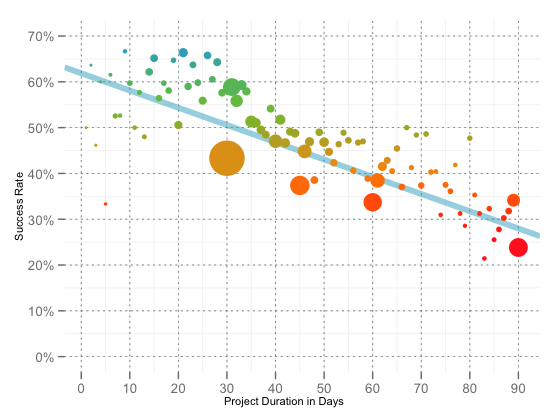7 strategies to advance your project management career
Every single one of us manages projects: it is how we achieve any goal in our life. How well you do those projects decides your overall success in life. Project management is not just for people who want to climb high up the corporate ladder; it is a critically important life skill for everyone who wants to make the most of their existence.
According to the US Equal Employment Opportunity Commission (EEOC), the typical person is only working at 50% of his or her potential. Even making a modest improvement in how you do your projects can help you quickly rise above the mediocrity.
Here are 7 strategies for managing projects that can help advance your career—and your other important life goals.
1. ‘Right’ sized
Which reality would you prefer?
a) I find the best way to work with what I have to get the job done, and I pick the right projects based on what and who I have available to work with. It’s amazing what we accomplish.
b) I could do better if those around me would do their jobs better, and I don’t have the resources I need to do my job as well as I could.
c) I don’t have enough authority and can’t do my job that well because people in authority don’t know what my job is.
If you chose a), you want to live in a reality where you focus on your circle of influence, rather than your circle of concern. Your circle of influence comprises the things in your life that you have control over, while your circle of concern includes things that you don’t have control of. To ‘right size’ your circle of influence, don’t give any power to the things in your life over which you have no control, as that is a sure way to become disengaged from your work and your life.
2. Make ‘someday’ today
A study conducted by KickStarter found that the more time was given to do a project, the less likely that that project would ever be completed. They even created a nifty graph to demonstrate this phenomenon:
Graph: Project duration versus success rate (www.kickstarter.com)
When you give yourself a tight timeline, you will be amazed at what you can accomplish. The closer you are to a deadline, the more you will focus on the deadline and complete the tasks necessary to finish.
3. Leverage your strengths
According to a 2012 Gallup survey, when Americans use their strengths more, they stress less. Still, the study finds, only 1 in 4 adults live and work in an area that capitalises on their strengths. When you work from your innate strengths, time becomes irrelevant while you intently focus on the task at hand. This is called being in a state of flow. What are your areas of strength where you achieve the state of flow?
4. Accept imperfections as perfect
While attention to detail is important, being a perfectionist can often do more harm than good. Perfectionism can hurt when you wait to know everything there is to know before starting to pursue a goal.
In project management there is a term called ‘progressive elaboration’, which means you will become aware of what you need to know as the project progresses, even if your knowledge is minimal at the start. Recognise that your imperfections are perfect for you at this moment and go after your goals anyway.
5. Destroy distractions
Business Week reported that distractions cost US businesses $650 billion a year. After you identify the biggest distractions in your life, you need to work hard to rid yourself of these addictions, just as if you were quitting smoking or coffee: with patience and diligence. You can learn how to improve your ability to focus amid all the distractions of our time, it’s just like any other skill you can learn and master.
6. Attract the right people
The quality of your life depends greatly on the quality of your associations. Social capital—the people you know and the connections you have with them—is a very important source of capital that you need to cultivate throughout your life and your career.
As important as attracting the right people is interacting with them in a way that engages their strengths. When you learn how to engage with people’s innate strengths while leveraging your own, every interaction (also known as a ‘negotiation’) becomes an opportunity for creative collaboration where you can create more by leveraging each person’s strengths than you could by going it alone.
7. Reduce risk
We all have different levels of risk we can tolerate in our lives, and this seems to change on a moment-by-moment basis. Instead of worrying about risks, you can get more done when you manage them. Risk management is a continuous process in which you identify, analyse, implement strategies to mitigate, and communicate key information about risks. When you are able to both increase your tolerance for risk AND reduce risks, you can finish your projects faster while using fewer resources.
These are 7 key strategies you can put into use today to create more success in all areas of your life.
Co-authored with Kristen Medina


